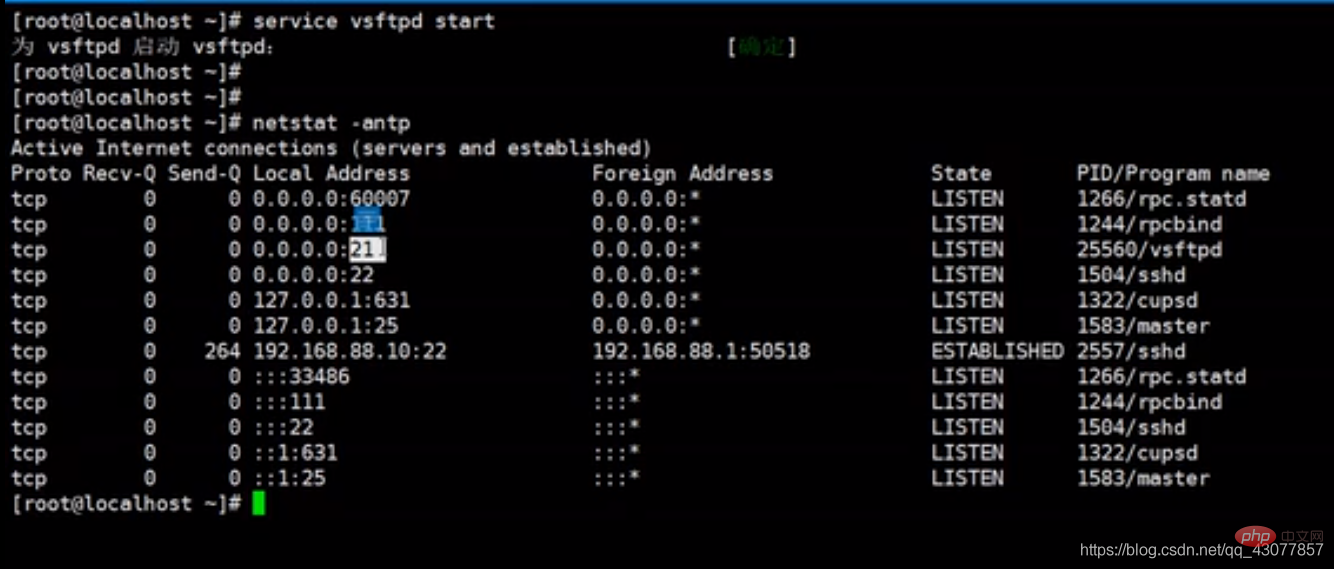What is the difference between centos7 and centos6
Differences: 1. The centos7 kernel is "3.10" and the centos6 kernel is "2.6"; 2. The file systems are different. CentOS6 uses ext4 by default, while CentOS7 uses xfs; 3. The default hard disk scheduling algorithm is different. CentOS6 uses cfq, while CentOS7 uses deadline.

#The operating environment of this tutorial: centos7 system, thinkpad t480 computer.
The difference between centos6 and centos7
Kernel
centos7’s kernel uses 3.10
The kernel of centos6 uses 2.6
File system
centos6.X:EXT4
The single file system capacity of Ext4 reaches 1EB, the single file size reaches 16TB
centos7.x: XFS
XFS supports a single file system of 8EB and 1 byte by default. The maximum supported file size is 9EB. The size is 18EB
Default hard disk scheduling algorithm
CentOS6 uses cfq by default, while CentOS7 uses deadline.
Firewall
centos6.X :iptables
centos7.X:firealld (In fact, centos7.x also supports iptables, but firewalld is installed by default , the current operation is generally to uninstall firewalld, and then install iptables)
Database
centos6.x The default database is: Mysql
centos7.x The default library is: MariaDB
Time synchronization
centos 6.X:ntpq -p (Multiple servers need to connect to the time server, and the time is slightly different at this time Yes, you need to execute this command. Then build your own time server)
centos 7.x:chronyc sources
Modify the time zone (generally speaking, it has been set during installation )
centsos6.x: /etc/sysconfig/clock (temporary modification) Here directly use vi /etc/sysconfig/clock to modify this configuration file
centos7.X: timedatectl set -timezone Asia/Shanghai (almost a permanent modification, your configuration file will be synchronized)
timedatectl This is to view
Then timedatectl set-timezone Asia/Shanghai to modify
Modify language
centos6. 8 (This is a command modification)
localectl This is for viewing.
Services installed under the rpm package
centos6.x:- Start the specified service: service service name start
- Close the specified service: service service name stop
- Restart the specified service: service service name restart
- View the status of the specified service: service service name status
- View the status of all services: service --status-all
- Set service startup: chkconfig Service name on
- Set the service not to start automatically; chkconfig Service name off
- View the self-starting status of all services; chkconfig --list
- Start the specified service: systemctl start service name
- Close the specified service: systemctl stop Service name
- Restart the specified service: systemctl restart Service name
- View the status of the specified service: systemctl status Service name
- View all service status: systemctl list-units
- Set service auto-start: systemctl enable service name
- Set service not Self-start;systemctl disable service name
- View the self-start status of all services;systemctl list-unit-files


 ##Check where the command is: which ifconfig
##Check where the command is: which ifconfig
Then check /sbin/ifconfig
Then check which package this belongs to: rpm -qf /sbin/ifconfig
Network card name:CentOS 6.X network card name is: eth0
CentOs 7.x network card name is: ens33
Network Configuration commandCentOS 6.X: ifconfig/set
CentOs 7.X: ip/nmtui
View ip command is ip address show
Network service:Centos 6.X uses the network service by default
Centos 7.x uses the NetworkManager service by default (network is used as a backup)
Recommended: "
centos usage tutorialThe above is the detailed content of What is the difference between centos7 and centos6. For more information, please follow other related articles on the PHP Chinese website!

Hot AI Tools

Undresser.AI Undress
AI-powered app for creating realistic nude photos

AI Clothes Remover
Online AI tool for removing clothes from photos.

Undress AI Tool
Undress images for free

Clothoff.io
AI clothes remover

Video Face Swap
Swap faces in any video effortlessly with our completely free AI face swap tool!

Hot Article

Hot Tools

Notepad++7.3.1
Easy-to-use and free code editor

SublimeText3 Chinese version
Chinese version, very easy to use

Zend Studio 13.0.1
Powerful PHP integrated development environment

Dreamweaver CS6
Visual web development tools

SublimeText3 Mac version
God-level code editing software (SublimeText3)

Hot Topics
 1386
1386
 52
52
 CentOS7 various version image download addresses and version descriptions (including Everything version)
Feb 29, 2024 am 09:20 AM
CentOS7 various version image download addresses and version descriptions (including Everything version)
Feb 29, 2024 am 09:20 AM
When loading CentOS-7.0-1406, there are many optional versions. For ordinary users, they don’t know which one to choose. Here is a brief introduction: (1) CentOS-xxxx-LiveCD.ios and CentOS-xxxx- What is the difference between bin-DVD.iso? The former only has 700M, and the latter has 3.8G. The difference is not only in size, but the more essential difference is that CentOS-xxxx-LiveCD.ios can only be loaded into the memory and run, and cannot be installed. Only CentOS-xxx-bin-DVD1.iso can be installed on the hard disk. (2) CentOS-xxx-bin-DVD1.iso, Ce
 Steps to enter CentOS 7 emergency repair mode
Jan 13, 2024 am 09:36 AM
Steps to enter CentOS 7 emergency repair mode
Jan 13, 2024 am 09:36 AM
Open the centos7 page and appear: welcome to emergency mode! afterloggingin, type "journalctl -xb" to viewsystemlogs, "systemctlreboot" toreboot, "systemctldefault" to tryagaintobootintodefaultmode. giverootpasswordformaintenance(??Control-D???): Solution: execute r
 How to access and clean junk files in /tmp directory in CentOS 7?
Dec 27, 2023 pm 09:10 PM
How to access and clean junk files in /tmp directory in CentOS 7?
Dec 27, 2023 pm 09:10 PM
There is a lot of garbage in the tmp directory in the centos7 system. If you want to clear the garbage, how should you do it? Let’s take a look at the detailed tutorial below. To view the list of files in the tmp file directory, execute the command cdtmp/ to switch to the current file directory of tmp, and execute the ll command to view the list of files in the current directory. As shown below. Use the rm command to delete files. It should be noted that the rm command deletes files from the system forever. Therefore, it is recommended that when using the rm command, it is best to give a prompt before deleting the file. Use the command rm-i file name, wait for the user to confirm deletion (y) or skip deletion (n), and the system will perform corresponding operations. As shown below.
 How to set password rules in centos7? How to set password rules in centos7
Jan 07, 2024 pm 01:17 PM
How to set password rules in centos7? How to set password rules in centos7
Jan 07, 2024 pm 01:17 PM
Set password rules for security reasons Set the number of days after which passwords expire. User must change password within days. This setting only affects created users, not existing users. If setting to an existing user, run the command "chage -M (days) (user)". PASS_MAX_DAYS60#Password expiration time PASS_MIN_DAYS3#Initial password change time PASS_MIN_LEN8#Minimum password length PASS_WARN_AGE7#Password expiration prompt time Repeat password restriction use [root@linuxprobe~]#vi/etc/pam.d/system-auth#nearline15:
 How to install mbstring extension under CENTOS7?
Jan 06, 2024 pm 09:59 PM
How to install mbstring extension under CENTOS7?
Jan 06, 2024 pm 09:59 PM
1.UncaughtError:Calltoundefinedfunctionmb_strlen(); When the above error occurs, it means that we have not installed the mbstring extension; 2. Enter the PHP installation directory cd/temp001/php-7.1.0/ext/mbstring 3. Start phpize(/usr/local/bin /phpize or /usr/local/php7-abel001/bin/phpize) command to install php extension 4../configure--with-php-config=/usr/local/php7-abel
 How to install Mysql in CentOS7 and set it to start automatically at boot
Jun 02, 2023 pm 08:36 PM
How to install Mysql in CentOS7 and set it to start automatically at boot
Jun 02, 2023 pm 08:36 PM
Centos7 does not have a mysql database. The default database is mariadb (a branch of mysql). You can install the mysql database manually by following the steps below. 1. Download the rpm installation file wgethttp://repo.mysql.com/mysql-community-release-el7.rpm 2. Execute rpm to install rpm-ivhmysql-community-release-el7.rpm. After the dependency resolution is completed, the following options appear: dependenciesresolved =================================
 Detailed explanation of decompression file command (zip) under centos7
Jan 07, 2024 pm 06:30 PM
Detailed explanation of decompression file command (zip) under centos7
Jan 07, 2024 pm 06:30 PM
1. The compressed folder is a zip file [root@cgls]#zip-rmydata.zipmydata2. Unzip mydata.zip into the mydatabak directory [root@cgls]#unzipmydata.zip-dmydatabak3.mydata01 folder and mydata02.txt are compressed into mydata.zip[root@cgls]#zipmydata.zipmydata01mydata02.txt4. Decompress the mydata.zip file directly [root@cgls]#unzipmydata.zip5. View myd
 How to modify and set the default shortcut keys of CentOS7?
Jan 09, 2024 pm 06:14 PM
How to modify and set the default shortcut keys of CentOS7?
Jan 09, 2024 pm 06:14 PM
When the default shortcut keys conflict with the keys of the software you are using or you need to use the shortcut keys according to your own habits, you have to modify and set the default shortcut keys. How to modify the default shortcut keys of CentOS7? Let’s take a look at the detailed tutorial below. 1. Start the Centos7 system in the virtual machine and enter the desktop. 2. Click Applications->System Tools->Settings in the upper left corner. 3. Enter the setting interface and click the device. 4. Select Keyboard and click any item on the right. And press the shortcut key to be set on the keyboard to change its shortcut key (note that some cannot be changed!) 5. After the change, as shown below, finally click Settings, so that the shortcut key setting modification is completed.




